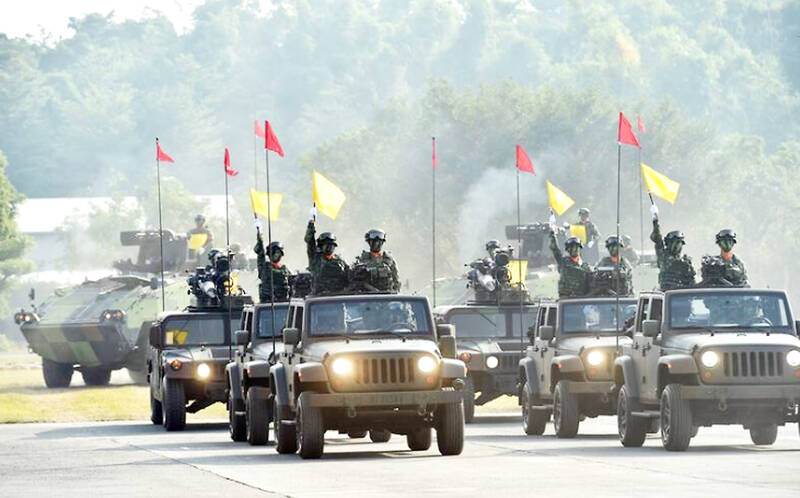The Ministry of National Defense has terminated a contract for maintenance of army jeeps with Idano Co (壹達諾汽車系統) after finding Chinese parts in components supplied by the firm, a high-ranking defense official said yesterday.
The Army Command Headquarters said it terminated the contract following a review of internal reports released in May that showed the contractor was supplying the military’s Storm 3 light tactical utility vehicles with parts made in China.
The command requested and obtained ministry authorization to terminate the contract, it said, adding that army units are to individually source parts for their vehicles until a new service-wide contract is awarded.

Photo: Military News Agency
Idano in November last year was awarded a NT$200 million (US$6.35 million) contract to maintain the military’s Storm 3 utility trucks, said the official, who asked to remain anonymous.
The company sourced the parts from subcontractors, the official added.
The move was widely criticized by lawmakers and media firms, as Idano had a net worth of just NT$1 million at the time, the official said.
Military personnel complained about poor quality control of parts supplied by Idano and the discovery of Chinese parts was the last straw for army brass, the official said.
In 2009, the ministry awarded Sanyang Motors (三陽工業) and AEI, an Israel-based firm, a NT$4.8 billion contract to supply the armed forces with 3,598 Storm 3 vehicles to replace M151 jeeps and several types of Humvee.
The military ordered three Storm 3 variants, the soft-top, the soft-top with a machine gun mount and the hard-top.
The project was plagued with production issues, including headlights that failed to meet army standards, which delayed initial delivery of the vehicles from 2011 to late 2015.
Some military units that received the trucks have complained about their build quality.
The army has said that the Storm 3 project was conducted in accordance to the law.
In other news, the ministry on Monday announced that the Chungshan Institute of Science and Technology has been awarded a NT$916 million limited-bidding contract to maintain the army’s 17 CS/MPQ-90 Bee Eye mobile air defense phased array radar systems until December 2025.
The Bee Eye contract ensures the continued maintenance of the army’s mobile radar systems after the expiry of the manufacturer’s two-year warranty following their deployment in 2014, contract notification documents showed.
The contract allocated NT$204.39 million for this year, but gave no details about figures beyond that.
The vehicle-mounted radar systems are a key component of the military’s airspace defense, with their mobility providing an advantage over fixed systems if they are attacked.
Eleven more Bee Eye systems have been ordered to be deployed in Taiwan’s outlying counties starting this year.
Additional reporting by Aaron Tu

AIR SUPPORT: The Ministry of National Defense thanked the US for the delivery, adding that it was an indicator of the White House’s commitment to the Taiwan Relations Act Deputy Minister of National Defense Po Horng-huei (柏鴻輝) and Representative to the US Alexander Yui on Friday attended a delivery ceremony for the first of Taiwan’s long-awaited 66 F-16C/D Block 70 jets at a Lockheed Martin Corp factory in Greenville, South Carolina. “We are so proud to be the global home of the F-16 and to support Taiwan’s air defense capabilities,” US Representative William Timmons wrote on X, alongside a photograph of Taiwanese and US officials at the event. The F-16C/D Block 70 jets Taiwan ordered have the same capabilities as aircraft that had been upgraded to F-16Vs. The batch of Lockheed Martin

GRIDLOCK: The National Fire Agency’s Special Search and Rescue team is on standby to travel to the countries to help out with the rescue effort A powerful earthquake rocked Myanmar and neighboring Thailand yesterday, killing at least three people in Bangkok and burying dozens when a high-rise building under construction collapsed. Footage shared on social media from Myanmar’s second-largest city showed widespread destruction, raising fears that many were trapped under the rubble or killed. The magnitude 7.7 earthquake, with an epicenter near Mandalay in Myanmar, struck at midday and was followed by a strong magnitude 6.4 aftershock. The extent of death, injury and destruction — especially in Myanmar, which is embroiled in a civil war and where information is tightly controlled at the best of times —

Taiwan was ranked the fourth-safest country in the world with a score of 82.9, trailing only Andorra, the United Arab Emirates and Qatar in Numbeo’s Safety Index by Country report. Taiwan’s score improved by 0.1 points compared with last year’s mid-year report, which had Taiwan fourth with a score of 82.8. However, both scores were lower than in last year’s first review, when Taiwan scored 83.3, and are a long way from when Taiwan was named the second-safest country in the world in 2021, scoring 84.8. Taiwan ranked higher than Singapore in ninth with a score of 77.4 and Japan in 10th with

SECURITY RISK: If there is a conflict between China and Taiwan, ‘there would likely be significant consequences to global economic and security interests,’ it said China remains the top military and cyber threat to the US and continues to make progress on capabilities to seize Taiwan, a report by US intelligence agencies said on Tuesday. The report provides an overview of the “collective insights” of top US intelligence agencies about the security threats to the US posed by foreign nations and criminal organizations. In its Annual Threat Assessment, the agencies divided threats facing the US into two broad categories, “nonstate transnational criminals and terrorists” and “major state actors,” with China, Russia, Iran and North Korea named. Of those countries, “China presents the most comprehensive and robust military threat